German days of the week (Days in German)
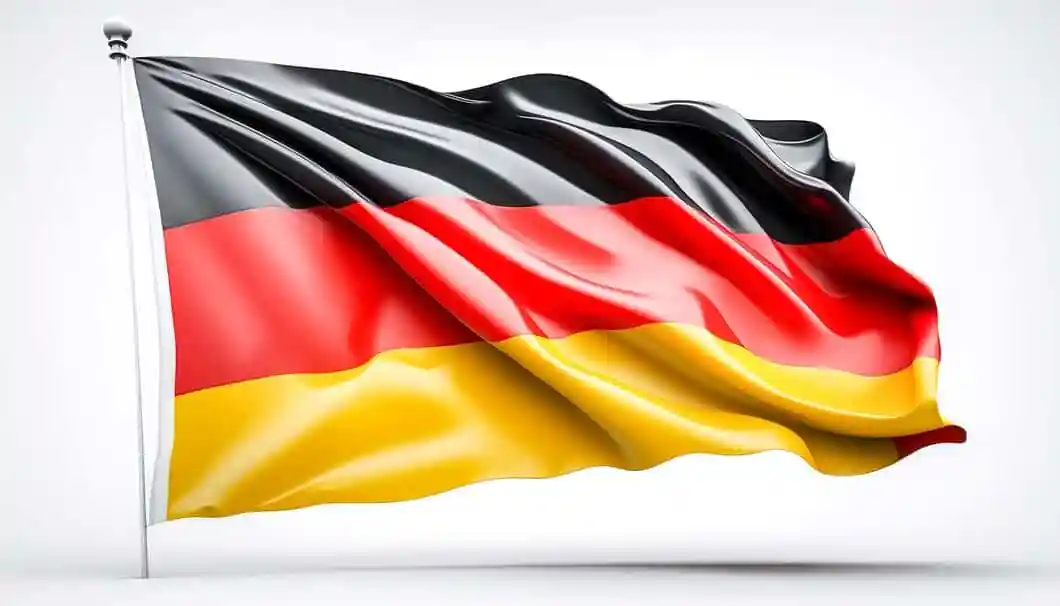
In this lesson, we will learn the days of the week in German. The pronunciation of some German day names is similar to the pronunciation of English day names. As you know, there are 7 days in a week. Now we will learn the days of the week in German. Learning the days of the week in German is easy. After all, you will only need to memorize 7 words. We will teach you the German days in a short time.
The days of the week are often one of the first steps in the process of language learning. This is one of the first basic concepts you encounter when starting to learn a new language. Just like basic words you learn as a child such as “mother”, “father”, “hello”, and “thank you”, learning the days of the week is also one of the building blocks of language.
After starting with these basic words, you usually progress towards counting, colors, and aspects of daily life. This enables the early learning of routines and the concept of time. Therefore, learning the days of the week plays a significant role in the learning process because people need to track time in their daily lives.
If you’re learning German, mastering the days of the week in German is a crucial step that will make you more familiar with the language and help you feel more comfortable in daily communication. Learning the days of the week can also be seen as a way to improve your grammatical structures and vocabulary. So, focusing on the days of the week in your German learning journey will not only give you a solid foundation but also help you progress your language skills.
After learning the German days of the week, we will write many example sentences about the German days of the week. This way, you will learn the German days of the week and be able to create various sentences. After reading, you will even be able to tell what you are doing this week!
The days of the week in German
İçindekiler
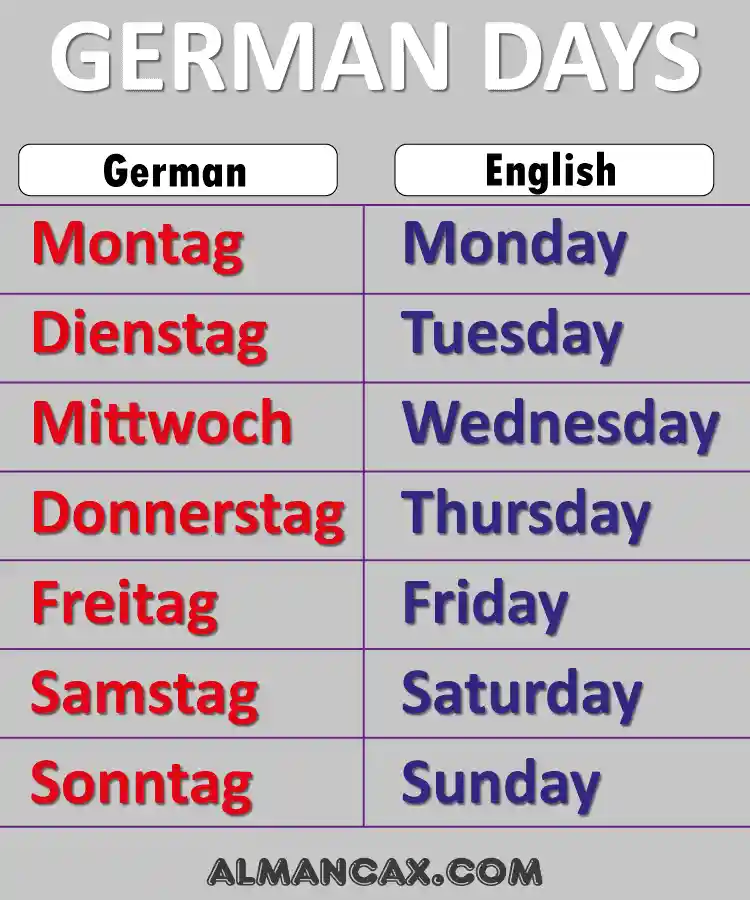
“In the German calendar, like the standard Western calendar, a week consists of seven days. However, unlike some Western countries (such as the United States, United Kingdom, and France), in Germany, the week starts on Monday instead of Sunday. Keep this in mind. Now, let’s write the seven days of the week in German in a table.”
| German Days of the Week | |
| Monday | Montag |
| Tuesday | Dienstag |
| Wednesday | Mittwoch |
| Thursday | Donnerstag |
| Friday | Freitag |
| Saturday | Samstag (Sonnabend) |
| Sunday | Sonntag |
In English, just like the days of the week end with “-day,” in German, the days of the week also end with “-tag” (except for Mittwoch). This is easy to remember because “guten Tag” (good day) is a standard greeting in German.
In German, the word for “Saturday” is “Samstag,” or alternatively, the word “Sonnabend” can be used. However, “Samstag” is used more commonly.
Let’s list the days of the week in German once again.
Days of the week in German:
- Montag → Monday
- Dienstag → Tuesday
- Mittwoch → Wednesday
- Donnerstag → Thursday
- Freitag → Friday
- Samstag / Sonnabend → Saturday
- Sonntag → Sunday
What is the gender (determiner) of the days of the week in German?
If you know a bit of German, you must have heard what the concept of “article (determiner)” means in the German language. In German, all words (except proper nouns) have a gender and an article (determiner). The article for German day names is “der Artikel.” Additionally, the gender of German day names is masculine. Now let’s write the days of the week in German with their articles (determiner):
- der Montag → Monday
- der Dienstag → Tuesday
- der Mittwoch → Wednesday
- der Donnerstag → Thursday
- der Freitag → Friday
- der Samstag (der Sonnabend) → Saturday
- der Sonntag → Sunday
Short spellings of German day names
Just like in English, in German, the names of the days are written in abbreviated form in calendars. The abbreviated form of German days consists of the first two letters of the day’s name.
Montag : Mo
Dienstag : Di
Mittwoch : Mi
Donnerstag : Do
Freitag : Fr
Samstag : Sa
Sonntag : So
German day names
In German, names are always written with capital letters in a noticeable way. However, is a word like “Montag” considered a proper noun? Let’s take a deeper look into this matter.
Generally, basic concepts like the days of the week are treated as proper nouns and therefore written with capital letters. However, there is an exception here: When expressing a habitual action performed on a specific day of the week – for example, “I do it on Fridays” – then the word “day” is not capitalized.
If we were to give an example that adheres to this rule, in German, we would express the phrase “I do sports on Fridays” as “Ich mache freitags Sport.” The point to note here is the “s” at the end of the word “freitags” because this expression indicates a habitual action performed on a specific day of the week.
Now let’s demonstrate how the names of the days should be written in German when expressing habitual activities on any day of the week. For example, when writing sentences like “I go to a language course on Saturdays” or “I relax at home on Sundays,” how do we write the German day names?
German days and recurring events
Recurring event – days of the week in German
montags → Mondays
dienstags → Tuesdays
mittwochs → Wednesdays
donnerstags → Thursdays
freitags → Fridays
samstags / sonnabends → Saturdays
sonntags → Sundays
Expressing a specific day (one-time event) in German
One time event
am Montag → on Monday
am Dienstag → on Tuesday
am Mittwoch → on Wednesday
am Donnerstag → on Thursday
am Freitag → on Friday
am Samstag / am Sonnabend → on Saturday
am Sonntag → on Sunday
Sentences with days in German
We have given sufficient information about the days of the week in German. Now let’s write sample sentences about days in German.
Montag (Monday) sentences
- Montag ist der erste Tag der Woche. (Monday is the first day of the week.)
- Am Montag habe ich einen Arzttermin. (I have a doctor’s appointment on Monday.)
- Jeden Montag gehe ich ins Fitnessstudio. (I go to the gym every Monday.)
- Montags esse ich gerne Pizza. (I like to eat pizza on Mondays.)
- Der Montagmorgen beginnt immer mit einer Tasse Kaffee. (Monday morning always starts with a cup of coffee.)
Dienstag (Tuesday) sentences
- Dienstag ist mein arbeitsreichster Tag. (Tuesday is my busiest day.)
- Am Dienstag treffe ich mich mit meinen Freunden zum Abendessen. (On Tuesday, I meet my friends for dinner.)
- Dienstags habe ich immer Deutschkurs. (I always have German class on Tuesdays.)
- Ich gehe dienstags immer zum Markt, um frisches Obst und Gemüse zu kaufen. (I always go to the market on Tuesdays to buy fresh fruits and vegetables.)
- Am Dienstagabend schaue ich gerne Filme. (I like to watch movies on Tuesday evenings.)
Mittwoch (Wednesday) sentences
- Mittwoch ist die Mitte der Woche. (Wednesday is the middle of the week.)
- Mittwochs habe ich frei. (I’m off on Wednesdays.)
- Ich treffe mich mittwochs immer mit meiner Familie zum Abendessen. (I always meet my family for dinner on Wednesdays.)
- Mittwochs gehe ich gerne spazieren. (I like to go for a walk on Wednesdays.)
- Am Mittwochmorgen lese ich gerne Zeitung. (I like to read the newspaper on Wednesday mornings.)
Donnerstag (Thursday) sentences
- Donnerstag ist der Tag vor dem Wochenende. (Thursday is the day before the weekend.)
- Am Donnerstag habe ich einen wichtigen Termin. (I have an important appointment on Thursday.)
- Donnerstags mache ich Yoga. (I do yoga on Thursdays.)
- Ich treffe mich donnerstags immer mit meiner Freundin zum Kaffeetrinken. (I always meet my friend for coffee on Thursdays.)
- Donnerstagabends gehe ich gerne ins Kino. (I like to go to the cinema on Thursday evenings.)
Freitag (Friday) sentences
- Freitag ist mein Lieblingstag, weil das Wochenende beginnt. (Friday is my favorite day because the weekend starts.)
- Am Freitagabend treffe ich mich mit meinen Kollegen zum Ausgehen. (On Friday evenings, I meet my colleagues for a night out.)
- Freitags esse ich gerne Sushi. (I like to eat sushi on Fridays.)
- Ich gehe freitags immer früh ins Bett, um am Wochenende ausgeruht zu sein. (I always go to bed early on Fridays to be well-rested for the weekend.)
- Freitagmorgens trinke ich gerne einen frischen Orangensaft. (I like to have fresh orange juice on Friday mornings.)
Samstag (Saturday) sentences
- Samstag ist ein Tag zum Entspannen. (Saturday is a day for relaxing.)
- Am Samstagmorgen gehe ich gerne joggen. (I like to go jogging on Saturday mornings.)
- Samstags besuche ich oft den Flohmarkt. (I often visit the flea market on Saturdays.)
- Ich treffe mich samstags gerne mit Freunden zum Brunch. (I like to meet friends for brunch on Saturdays.)
- Am Samstagnachmittag lese ich gerne Bücher. (I like to read books on Saturday afternoons.)
Sonntag (Sunday) sentences
- Sonntag ist ein ruhiger Tag. (Sunday is a quiet day.)
- Am Sonntag schlafe ich gerne aus. (I like to sleep in on Sundays.)
- Sonntags koche ich immer ein großes Frühstück für meine Familie. (I always cook a big breakfast for my family on Sundays.)
- Ich gehe sonntags gerne im Park spazieren. (I enjoy taking a walk in the park on Sundays.)
- Am Sonntagabend schaue ich gerne Filme zu Hause. (I like to watch movies at home on Sunday evenings.)
More example sentences about days in German
Montag ist der erste Tag. (Monday is the first day.)
Ich arbeite am Dienstag. (I work on Tuesday.)
Mittwoch ist mein Geburtstag. (Wednesday is my birthday.)
Wir treffen uns am Donnerstag. (We meet on Thursday.)
Freitagabend gehe ich aus. (I go out on Friday evening.)
Am Samstag habe ich frei. (I am off on Saturday.)
Sonntag ist ein Ruhetag. (Sunday is a day of rest.)
Ich gehe Montag zum Arzt. (I go to the doctor on Monday.)
Dienstagmorgen trinke ich Kaffee. (I drink coffee on Tuesday morning.)
Am Mittwoch esse ich Pizza. (I eat pizza on Wednesday.)
Donnerstagabend sehe ich fern. (I watch TV on Thursday evening.)
Freitag ist mein Lieblingstag. (Friday is my favorite day.)
Samstagmorgen gehe ich joggen. (I go jogging on Saturday morning.)
Am Sonntag lese ich ein Buch. (I read a book on Sunday.)
Montags gehe ich früh schlafen. (I go to bed early on Mondays.)
Dienstag ist ein langer Tag. (Tuesday is a long day.)
Mittwochmittag esse ich Salat. (I eat salad on Wednesday afternoon.)
Donnerstag treffe ich Freunde. (I meet friends on Thursday.)
Freitagvormittag habe ich einen Termin. (I have an appointment on Friday morning.)
Samstagabend gehe ich ins Kino. (I go to the movies on Saturday evening.)
Sonntagmorgen frühstücke ich gerne. (I like to have breakfast on Sunday morning.)
Montag ist der Anfang der Woche. (Monday is the beginning of the week.)
Am Dienstag lerne ich Deutsch. (I learn German on Tuesday.)
Mittwochabend esse ich mit meiner Familie. (I eat with my family on Wednesday evening.)
Donnerstag ist fast Wochenende. (Thursday is almost the weekend.)
Freitagmorgen trinke ich Orangensaft. (I drink orange juice on Friday morning.)
Am Samstag treffe ich mich mit Freunden. (I meet with friends on Saturday.)
Sonntagabend schaue ich fern. (I watch TV on Sunday evening.)
Montagmorgen fahre ich mit dem Bus. (I take the bus on Monday morning.)
Dienstagabend koche ich Pasta. (I cook pasta on Tuesday evening.)
Interesting information about German day names
Day names in German, like in many languages, have historical and cultural significance, often rooted in the Germanic and Norse traditions. German day names reflect the influence of both Christian and pagan traditions, with some names derived from gods in Germanic mythology and others from Latin or Christian origins. Understanding the origins and meanings of these names provides insight into the linguistic and cultural heritage of the German-speaking world.
Montag (Monday)
The German word “Montag” is derived from the Latin phrase “Dies Lunae,” meaning “day of the moon.” This corresponds to the English name “Monday,” which also traces its origins to the moon. In Germanic mythology, Monday was associated with the god Mani, who was believed to ride across the night sky in a chariot drawn by horses, guiding the moon.
In many Germanic languages, including English, Monday is also named after the Moon. The Germanic peoples traditionally considered Monday as the second day of the week, following Sunday.
Expressions related to Monday in German include “einen guten Start in die Woche haben,” meaning “to have a good start to the week,” which is a common wish exchanged between colleagues or friends on Mondays.
Dienstag (Tuesday)
“Dienstag” comes from the Old High German word “Ziestag,” meaning “day of Ziu.” Ziu, or Tyr in Norse mythology, was the god of war and the sky. In Latin, Tuesday was called “Dies Martis,” named after the god of war, Mars. The connection between war and Tuesday may stem from the belief that battles fought on this day would be successful.
Dienstag, the German word for Tuesday, is derived from the Old High German word “dīnstag,” which translates to “Tiw’s day.” Tiw, or Týr in Norse mythology, was a god associated with war and justice. Tuesday, therefore, is named after this deity. In Germanic mythology, Tiw is often equated with the Roman god Mars, further solidifying the association of Tuesday with war and battle.
Mittwoch (Wednesday)
“Mittwoch” literally means “mid-week” in German. In Norse mythology, Wednesday is associated with Odin, the chief god and ruler of Asgard. Odin was also known as Woden, and the English name “Wednesday” is derived from “Woden’s day.” In Latin, Wednesday was referred to as “Dies Mercurii,” honoring the messenger god Mercury.
In Germanic mythology, Wednesday is associated with the god Odin (Woden), who was revered for his wisdom, knowledge, and magic. Therefore, Wednesday is sometimes referred to as “Wodensday” in English, and the German name “Mittwoch” maintains this connection.
Donnerstag (Thursday)
“Donnerstag” translates to “Thor’s day” in German. Thor, the god of thunder and lightning, was a prominent figure in Norse mythology and was associated with strength and protection. In Latin, Thursday was called “Dies Iovis,” named after the Roman god Jupiter, who shared attributes with Thor.
Freitag (Friday)
“Freitag” means “day of Freyja” or “Frigg’s day” in German. Freyja was a goddess associated with love, fertility, and beauty in Norse mythology. Frigg, another Norse goddess, was associated with marriage and motherhood. In Latin, Friday was referred to as “Dies Veneris,” named after Venus, the goddess of love and beauty.
In German culture, Friday is often celebrated as the end of the workweek and the beginning of the weekend. It is a day associated with relaxation, socializing, and leisure activities.
Samstag (Saturday)
“Samstag” is derived from the Hebrew word “Sabbat,” which means “Sabbath” or “day of rest.” It corresponds to the English name “Saturday,” which also has its roots in the Sabbath day. In many German-speaking regions, Saturday was traditionally considered a day for rest and religious observance.
Saturday in German is called either Samstag or Sonnabend, depending on the region. Both terms have their origins in Old High German. “Samstag” is derived from the word “sambaztag,” meaning “assembly day” or “gathering day,” reflecting the day’s historical significance as a day for markets or communal gatherings. “Sonnabend” is derived from “Sunnenavent,” meaning “evening before Sunday,” which highlights Saturday’s position as the day preceding Sunday.
In German culture, Saturday is often seen as a day for relaxation, recreation, and social activities. It is the traditional day for shopping, errands, and spending time with family and friends.
Sonntag (Sunday)
“Sonntag” means “day of the sun” in German. In Latin, Sunday was called “Dies Solis,” honoring the sun god, Sol. Sunday has long been associated with worship and rest in Christian tradition, as it commemorates the day of Christ’s resurrection. It is often considered the most important day of the week for religious observance and family gatherings.
In German culture, Sunday is often considered a day of rest, relaxation, and reflection. It is traditionally a day for religious observance, family gatherings, and leisure activities. Many businesses and shops are closed on Sundays, allowing people to focus on personal and social pursuits.
Historical and Cultural Significance
The names of the days of the week in German reflect a blend of ancient Germanic, Norse, Latin, and Christian influences. These names have evolved over centuries, reflecting changes in language, religion, and cultural practices. Understanding the origins of these names provides insights into the beliefs, values, and traditions of the German-speaking peoples throughout history.
Linguistic Analysis
The German names for the days of the week demonstrate the linguistic evolution of the German language. Many of these names have cognates in other Germanic languages, such as English, Dutch, and Swedish, reflecting their common linguistic roots. By examining the etymology and phonetics of these names, linguists can trace the historical development of the German language and its connections to other languages.
Cultural Practices and Traditions
The names of the days of the week have cultural significance beyond their linguistic roots. In many German-speaking regions, certain days of the week are associated with specific cultural practices and traditions. For example, Saturday is often a day for leisure activities, social gatherings, and outdoor excursions, while Sunday is reserved for religious observance and family time. Understanding these cultural practices provides insight into the daily lives and routines of people in German-speaking countries.
Literary and Folkloric References
The names of the days of the week appear frequently in literature, folklore, and mythology. Writers and poets throughout history have drawn inspiration from these names to create evocative imagery and symbolism in their works. For example, the Norse god Odin, associated with Wednesday, features prominently in Scandinavian sagas and myths. By exploring these literary and folkloric references, scholars gain a deeper understanding of the cultural significance of the days of the week in German-speaking countries.
Modern Usage and Adaptations
While the traditional names of the days of the week remain in use in modern German, there are also variations and adaptations that reflect contemporary language and culture. For example, in informal speech and writing, it is common to use abbreviations or nicknames for the days of the week, such as “Mo” for Montag or “Do” for Donnerstag. Additionally, in the age of globalization, English names for the days of the week are also widely understood and used in German-speaking countries, especially in business and technology sectors.
Conclusion:
The names of the days of the week in German carry rich historical, linguistic, and cultural significance. Rooted in ancient Germanic, Norse, Latin, and Christian traditions, these names reflect the beliefs, values, and practices of the German-speaking peoples throughout history. By studying the origins and meanings of these names, scholars gain valuable insights into the linguistic evolution, cultural heritage, and everyday life of German-speaking communities.
Germany’s special cultural days
Germany, with its rich history and cultural heritage, celebrates various traditional and modern holidays throughout the year. These German days encompass religious, historical, and seasonal festivities, each offering unique insights into the country’s customs, beliefs, and values. From Oktoberfest to Christmas markets, German Days provide a glimpse into the heart of German culture.
New Year’s Day (Neujahrstag)
New Year’s Day marks the beginning of the calendar year and is celebrated with fireworks, parties, and gatherings across Germany. Germans often engage in the tradition of “Silvester,” or New Year’s Eve, where they enjoy festive meals, watch televised concerts, and participate in street celebrations. Many also make resolutions for the upcoming year.
Three Kings’ Day (Heilige Drei Könige)
Three Kings’ Day, also known as Epiphany, commemorates the visit of the Magi to the baby Jesus. In Germany, it is celebrated with religious services and traditional customs such as the “Sternsinger,” where children dressed as the Three Kings go from house to house singing carols and collecting donations for charity.
Valentine’s Day (Valentinstag)
Valentine’s Day is celebrated in Germany much like in other parts of the world, with couples exchanging gifts, flowers, and romantic gestures. However, it is also a day for friendship, known as “Freundschaftstag,” where friends exchange cards and small tokens of appreciation.
Carnival (Karneval or Fasching)
Carnival season, known as “Karneval” in the Rhineland and “Fasching” in other parts of Germany, is a festive time of parades, costumes, and revelry. Each region has its own unique traditions, but common elements include street processions, masked balls, and satirical performances.
International Women’s Day (Internationaler Frauentag)
International Women’s Day is celebrated in Germany with events, marches, and discussions highlighting women’s rights and achievements. It is a public holiday in the capital city of Berlin, where demonstrations and rallies draw attention to issues such as gender equality and workplace discrimination.
Easter (Ostern)
Easter is a major Christian holiday in Germany, celebrated with religious services, family gatherings, and festive foods. Traditional customs include decorating eggs, baking Easter bread and cakes, and participating in Easter egg hunts. In some regions, there are also Easter bonfires and processions.
May Day (Tag der Arbeit)
May Day, or Labor Day, is observed in Germany with demonstrations, rallies, and public celebrations organized by trade unions and political parties. It is a time to advocate for workers’ rights and social justice, with speeches, concerts, and street fairs held in cities across the country.
Mother’s Day (Muttertag)
Mother’s Day in Germany is a time to honor and appreciate mothers and maternal figures. Families typically celebrate with flowers, cards, and special meals. It is also common for children to make handmade gifts or perform acts of service for their mothers.
Father’s Day (Vatertag or Herrentag)
Father’s Day in Germany, also known as Ascension Day or Men’s Day, is celebrated with outdoor excursions, hiking trips, and gatherings with friends. Men often pull wagons filled with beer and snacks, known as “Bollerwagen,” as they walk through the countryside or visit local pubs.
Pentecost (Pfingsten)
Pentecost, or Whit Sunday, commemorates the descent of the Holy Spirit upon the apostles. In Germany, it is a time for religious services, family gatherings, and outdoor activities. Many people take advantage of the long weekend to go on short vacations or attend Pentecost markets and festivals.
Oktoberfest
Oktoberfest is the world’s largest beer festival, held annually in Munich, Bavaria. It attracts millions of visitors from around the globe who come to enjoy traditional Bavarian beer, food, music, and entertainment. The festival typically runs for 16-18 days from late September to the first weekend in October.
German Unity Day (Tag der Deutschen Einheit)
German Unity Day commemorates the reunification of East and West Germany on October 3, 1990. It is celebrated with official ceremonies, concerts, and cultural events throughout the country. The day is a national holiday, allowing Germans to reflect on their shared history and identity.
Halloween
Halloween has become increasingly popular in Germany, especially among younger generations. While not traditionally a German holiday, it is celebrated with costume parties, themed events, and trick-or-treating in neighborhoods and city centers.
St. Martin’s Day (Martinstag)
St. Martin’s Day is celebrated on November 11th in honor of St. Martin of Tours. In Germany, it is a time for lantern processions, bonfires, and sharing traditional foods such as roasted goose. Children often craft paper lanterns and parade through the streets singing songs.
Advent and Christmas (Advent und Weihnachten)
Advent marks the beginning of the Christmas season in Germany, with the lighting of Advent wreaths and calendars counting down the days until December 25th. Christmas markets, or “Weihnachtsmärkte,” spring up in cities and towns across the country, offering handmade gifts, decorations, and seasonal treats.
Christmas Eve (Heiligabend)
Christmas Eve is the main day of celebration in Germany, marked by family gatherings, festive meals, and the exchange of gifts. Many Germans attend midnight Mass or participate in candlelight services to commemorate the birth of Jesus Christ.
Boxing Day (Zweiter Weihnachtsfeiertag)
Boxing Day, also known as Second Christmas Day, is a public holiday in Germany observed on December 26th. It is a time for relaxation, leisure activities, and spending time with loved ones after the hustle and bustle of Christmas Day.
German days picture
At the end of our lesson, let’s see the days of the week in German once again and memorize them.
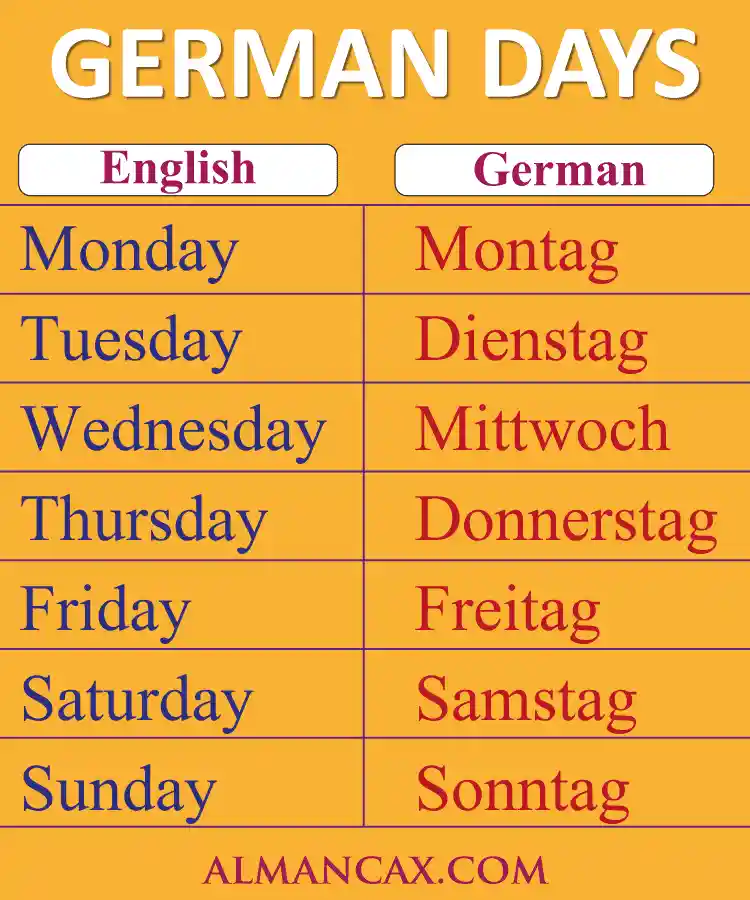







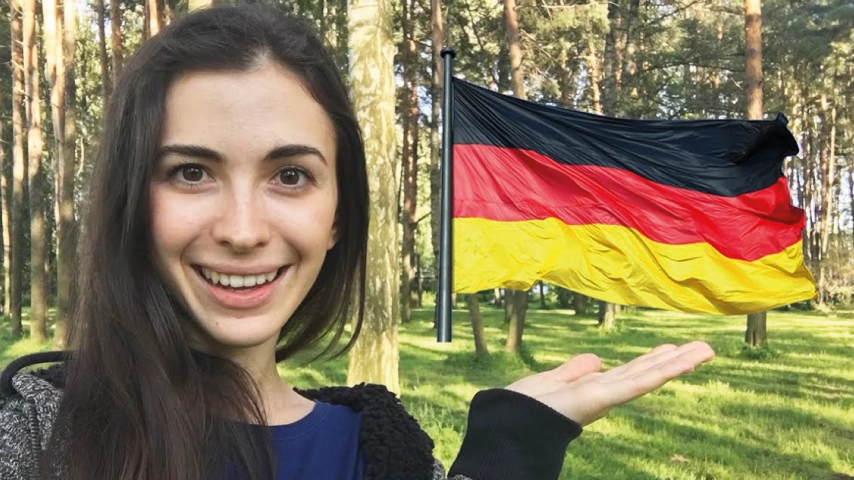
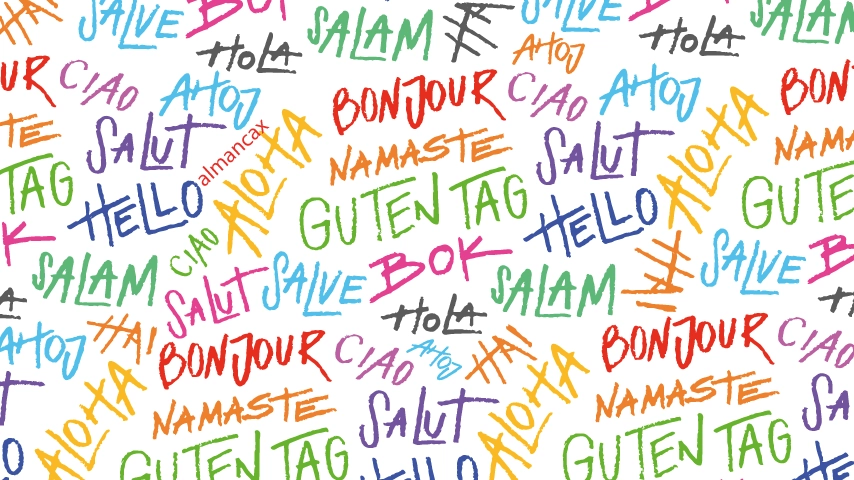




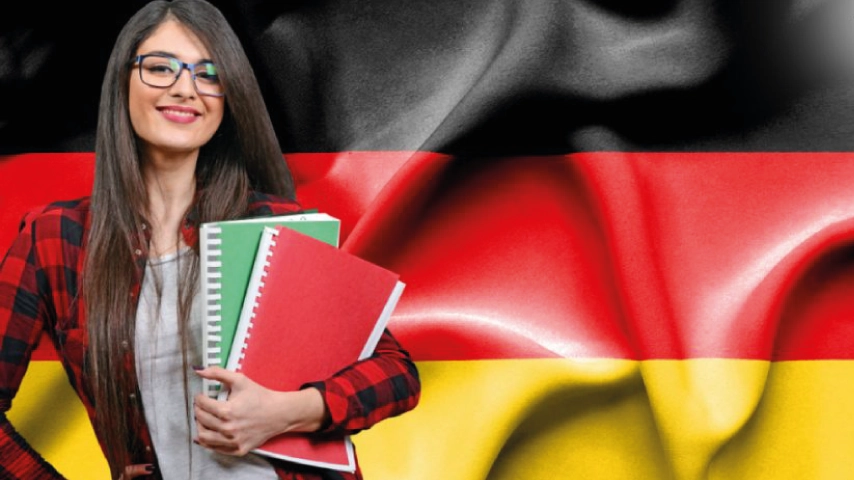





 Shqip
Shqip አማርኛ
አማርኛ العربية
العربية Հայերեն
Հայերեն Azərbaycan dili
Azərbaycan dili Euskara
Euskara Беларуская мова
Беларуская мова Bosanski
Bosanski Български
Български Català
Català 简体中文
简体中文 繁體中文
繁體中文 Corsu
Corsu Hrvatski
Hrvatski Čeština
Čeština Dansk
Dansk Nederlands
Nederlands English
English Esperanto
Esperanto Eesti
Eesti Suomi
Suomi Français
Français Galego
Galego ქართული
ქართული Deutsch
Deutsch Ελληνικά
Ελληνικά Ōlelo Hawaiʻi
Ōlelo Hawaiʻi עִבְרִית
עִבְרִית हिन्दी
हिन्दी Magyar
Magyar Íslenska
Íslenska Bahasa Indonesia
Bahasa Indonesia Italiano
Italiano 日本語
日本語 Basa Jawa
Basa Jawa ಕನ್ನಡ
ಕನ್ನಡ Қазақ тілі
Қазақ тілі 한국어
한국어 كوردی
كوردی Кыргызча
Кыргызча Latin
Latin Latviešu valoda
Latviešu valoda Lietuvių kalba
Lietuvių kalba Lëtzebuergesch
Lëtzebuergesch Македонски јазик
Македонски јазик Malagasy
Malagasy Bahasa Melayu
Bahasa Melayu മലയാളം
മലയാളം Maltese
Maltese नेपाली
नेपाली Norsk bokmål
Norsk bokmål فارسی
فارسی Polski
Polski Português
Português Română
Română Русский
Русский Gàidhlig
Gàidhlig Српски језик
Српски језик Slovenčina
Slovenčina Slovenščina
Slovenščina Español
Español Basa Sunda
Basa Sunda Svenska
Svenska ไทย
ไทย Türkçe
Türkçe Українська
Українська اردو
اردو O‘zbekcha
O‘zbekcha Tiếng Việt
Tiếng Việt